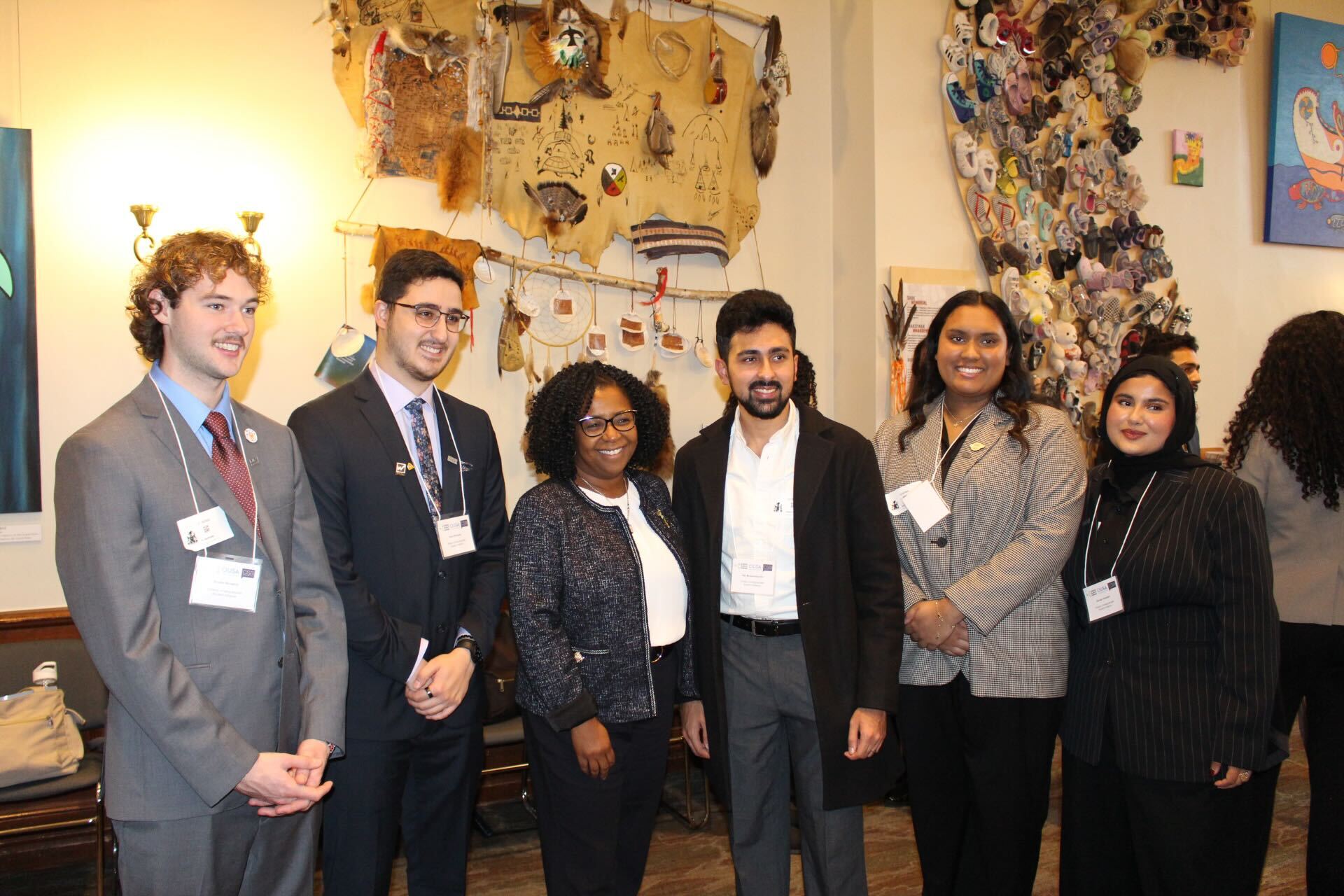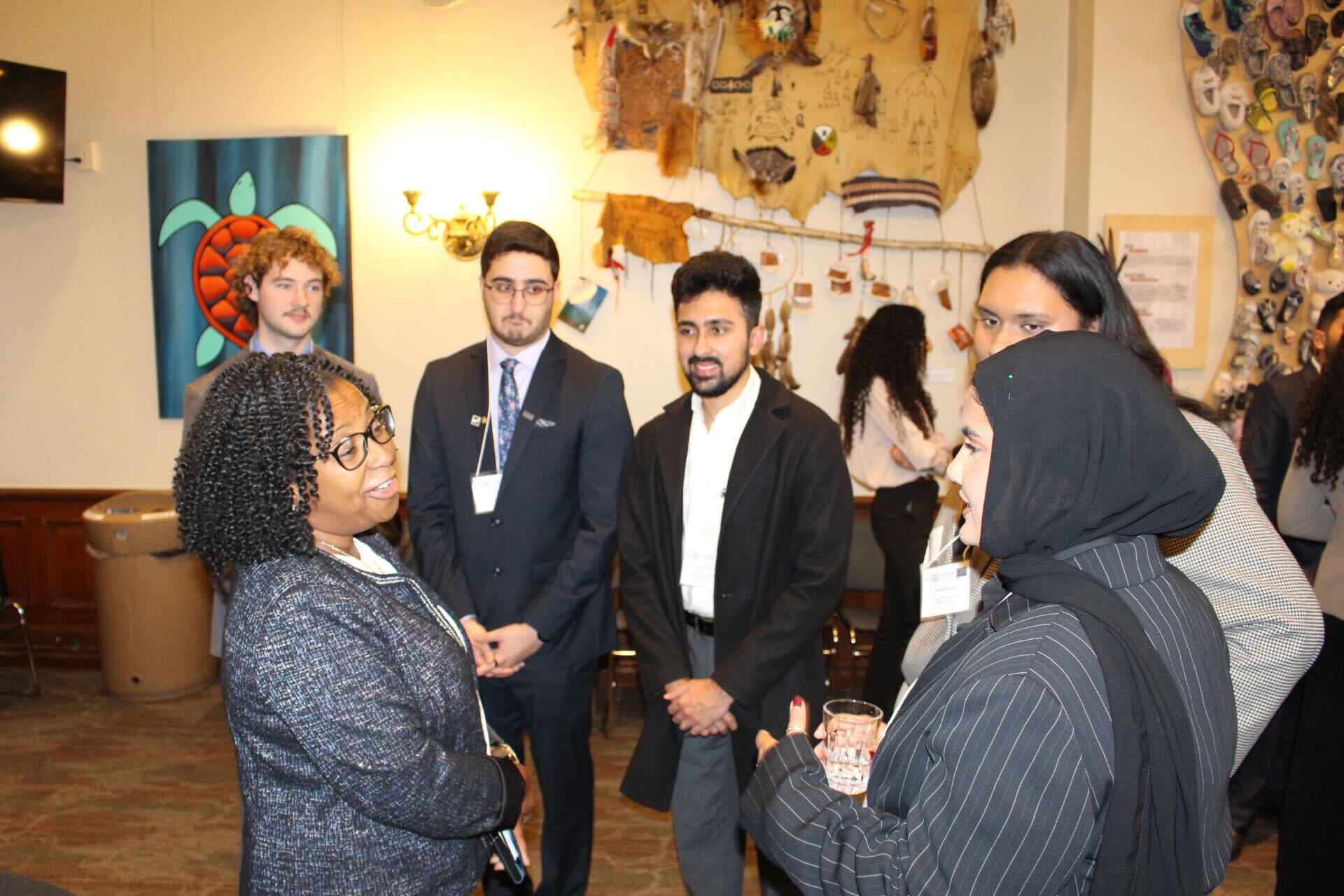Truth to Power: Student Advocacy Week at Queen's Park
Ever wondered what happens during Student Advocacy Week?
One of the Ontario Undergraduate Student Association’s (OUSA) marquee events is the Student Advocacy Conference (SAC), where steering committee members from each represented school, along with additional delegates, gather to meet with Members of Provincial Parliament, directly informing these change-makers of the issues that students face every day.
The President and I attended this year, and during these meetings, we lobbied for recommendations based on student experiences and surveys. It’s important to note that OUSA is a non-partisan, not-for-profit organization.
OUSA's advocacy priorities this year are:
- Investing in post-secondary education
- Food insecurity
- Addressing housing issues
- Response to hate-motivated attacks
Each of these priorities came with its own set of recommendations, backed by research and statistics, as well as data gathered from from OUSA's Ontario Undergraduate Student Survey, which polled the students at its membership schools including, Trent, McMaster, Western, Queen's, Brock, Waterloo, Laurentian, and Wilfred Laurier.

Key recommendations:
Investing in post-secondary education
- The provincial government should increase operating grants until students are contributing at most one-third of universities' total operating budget.
- The provincial government should remove interest on all student loans, including past students who still owe provincial student loans.
- The provincial government should ensure OSAP calculations include indirect costs of accessing post-secondary education, particularly accounting for diverse backgrounds and the effects of systemic oppression when distributing funding.
- The Ministry of Colleges and Universities should mandate that university budgets be made publicly available on their institutional website and that HEQCO produces a yearly report that outlines each university's tuition revenue breakdown, with both documents being written in an accessible manner.
Food Insecurity
- The provincial government should amend the Living Allowance under
- OSAP to allocate more funding for food expenses to account for inflation of prices and give students the resources to acquire the food options they want.
- The Ministry of Colleges and Universities should partner with the Council of Ontario Universities to complete a system analysis of food insecurity and systems on university campuses that centers the voices and experiences of affected students.
- The provincial government should establish a grant that student-run food banks can use to maintain the infrastructure required to provide nutritious and culturally relevant food options and food options that meet the requirements of various dietary restrictions (e.g., fridges and freezers).
Housing
- The provincial government should introduce rent control/maximum rent increases between tenancies in high-turnover units as part of the rental increase limits described within the Residential Tenancies Act, 2006.
- The provincial government should allocate additional funding to the Ministry of Colleges and Universities to expand OSAP to include a grant program that provides students in-need with financial assistance, specifically for their rental housing costs.
Response to hate-motivated attacks
- The Ministry of Colleges and Universities should mandate that all institution-based mental health care providers receive training on providing accessible, trauma-informed, and culturally relevant counselling and referrals to diverse populations.
- The provincial government should mandate that post-secondary institutions create a public plan within three years through responsible and meaningful consultation with students to create more compassionate, community-informed, and culturally and racially diverse campus safety models, including the reallocation of funding from any existing and future campus security or policing budgets to student-led and community-led non-enforcement crisis intervention services, social services, and mental health supports on campuses.
We all play a role
MPP's can support these initiatives in various ways, such as asking questions during question period, writing letters to the minister, or even signing petitions.
During the SAC, students had the opportunity to attend a reception with Minister Quinn and also participated in the Question Period.
By actively engaging with these issues, students help ensure that their voices are heard, creating a more supportive and inclusive environment for all students across Ontario.
If you have any questions regarding the recommendations or would like to know more, please reach out to me at vpaffairs.otsu@ontariotechu.ca.
Standing with you,
Zainab Hussain, VP Student Affairs

Read full article
Latest OTSU Blog
- Congratulations on an Incredible Semester, Ontario Tech Students!As we wrap up this semester, I want to take a moment to acknowledge your resilience, hard work, and commitment to making the most of your student experience. You’ve all navigated challenges, embraced opportunities, and contributed to our...
- Behind The Ballot: Your OTSU Elections Guide & Why Student Leadership MattersDid you know that many employers look for a graduate’s ability to problem-solve, communicate effectively, and work collaboratively with more than a high GPA?*Which begs the question: how do I get that experience? There are many ways to gain...
- Winter Fest 2025 EventsLet's face it, January can be a drag. The holidays are behind us, New Years Eve is a memory—sort of—and we're waiting around until Family day or Reading Week for some time off.But then we made Winter Fest and fixed all that!Every year in...
- Your Health, Our Priority: Remember your OTSU Health Plan This Winter!Hi Ridgebacks! The weather is getting colder, and with those inevitable gusts of snow, winter will officially be here—not to mention cold and flu season.But not to worry, the OTSU has a health plan for that!All full-time students are...
- OUSA Fall General Assembly And PlenaryEach year, the Ontario Undergraduate Student Alliance Steering Committee (SC) members choose a set of advocacy priorities that they consider relevant. This year’s advocacy priorities are:Investing in post secondary educationFood...
- Statement from the Board of Directors of the Ontario Tech Student UnionThe Ontario Tech Student Union Board of Directors has received your call to action through your numerous emails. We have heard your concerns about the Bylaws, downtown representation, transparency, governance, and the Special General Meeting. We...













